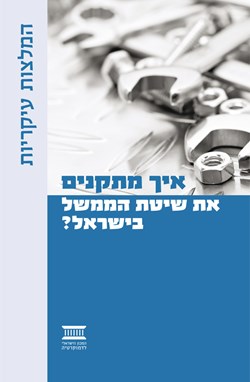How Can We Repair Israel’s Political System? Key Recommendations
- Written By: Prof. Gideon Rahat, Prof. Ofer Kenig, Dr. Chen Friedberg
- Publication Date:
- Cover Type: Softcover
- Number Of Pages: 26 Pages
- Center: Political Reform Program
Developed for Israeli policy-makers, this booklet is a summary of the content of the book <em>Reforming Israel's Political System</em>, which was . It offers an overview of the shortcomings of Israel’s political system in four areas—the electoral system, political parties, the Knesset, and the government—and presents key recommendations for reform.
Over the past twenty years, Israel’s political system has exhibited a number of weaknesses that impair the functioning of government institutions, and undermine public trust in politics and politicians. Therefore, it has become essential to reform the system. But reforming a system of government does not necessarily imply replacing it with another. Israel is a parliamentary democracy. For a variety of reasons, this is the system best suited to the State of Israel, and it is vital for preserving its democratic character. We should not, therefore, make the mistake of supplanting it with a presidential system.
But how do we go about “mending” the system? The Israel Democracy Institute has taken it upon itself to formulate tools for safeguarding and enhancing Israel’s parliamentary democracy. In the autumn of 2009, IDI established the Forum for Political Reform in Israel under the stewardship of Justice Meir Shamgar, President Emeritus of the Supreme Court of Israel. The Forum was assisted by a team of leading researchers who devoted two years to formulating recommendations for revamping the political system in Israel.
Research began by identifying the weak points of Israeli politics and governance. The research group considered the potential benefits of institutional reforms, comparing Israel with established democracies (Western European countries, the United States, Canada, Australia, New Zealand, and Japan) as well as successful new democracies (the Czech Republic and Poland). The working assumption was that improving the functioning of Israel's political institutions would promote more desirable political behavior, improve the political system, attract a cadre of gifted individuals to politics, and improve the image of politics and politicians in the eyes of the public. The result of this two-year research project was Reforming Israel’s Political System, a 760-page Hebrew book that presented the research group’s findings to the Israeli public.
This Hebrew booklet is a summary of the key themes of Reforming Israel's Political System, which was developed for Israel's policy makers. It offers an overview of the shortcomings of Israel’s political system in four areas—the electoral system, political parties, the Knesset, and the government—and presents key recommendations for reform. The goal of these recommendations is not to propose a revolutionary overhaul of Israel’s political system, but rather to suggest steps needed to fine-tune it. We propose reworking current institutional arrangements to bolster the large parties and their nucleus of power within the government; to strengthen the prime minister’s ability to govern; to foster genuine, binding coalition partnerships; to empower the Knesset to fulfill its oversight role; and foster more participatory democracy.

